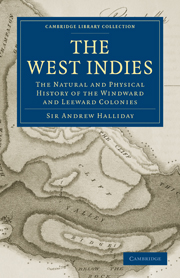Book contents
- Frontmatter
- Contents
- CHAPTER I
- CHAPTER II
- CHAPTER III
- CHAPTER IV
- CHAPTER V
- CHAPTER VI
- CHAPTER VI
- CHAPTER VII
- CHAPTER VIII
- CHAPTER IX
- CHAPTER X
- CHAPTER XI
- CHAPTER XII
- CHAPTER XIII
- CHAPTER XV
- CHAPTER XVI
- CHAPTER XVII
- CHAPTER XVIII
- CHAPTER XIX
- CHAPTER XX
- CHAPTER XXI
- CHAPTER XXII
- APPENDIX I
- APPENDIX II
- Plate section
- Frontmatter
- Contents
- CHAPTER I
- CHAPTER II
- CHAPTER III
- CHAPTER IV
- CHAPTER V
- CHAPTER VI
- CHAPTER VI
- CHAPTER VII
- CHAPTER VIII
- CHAPTER IX
- CHAPTER X
- CHAPTER XI
- CHAPTER XII
- CHAPTER XIII
- CHAPTER XV
- CHAPTER XVI
- CHAPTER XVII
- CHAPTER XVIII
- CHAPTER XIX
- CHAPTER XX
- CHAPTER XXI
- CHAPTER XXII
- APPENDIX I
- APPENDIX II
- Plate section
Summary
Though the Portuguese first discovered the island, and are said to have given it a name, it was not until after a Dutch ship had visited and examined its capabilities, that it excited any attention in Europe.
The Dutch captain, on his arrival in Holland, gave such a flattering account of his visit, that it attracted the attention of the English ambassador, who secretly transmitted the details to his friends in London, and they without loss of time fitted out two or three ships with adventurers. These went and took possession of Barbados in the name of the king of England, and from that hour (February 17th, 1625), to the present time, it has never acknowledged any other authority. James I., immediately before his death, had granted the sovereignty of Barbados, and of the other British colonies in the West Indies, to his favourite, Hay, Earl of Carlisle; other courtiers, at subsequent periods, got this grant changed or modified, but it was under the auspices of Hay that Barbados rose into importance, and after him the waters of Bridgetown were called Carlisle Bay. Many of the first planters were connected with the highest families in England. Their descendants have been ennobled, and many gentlemen of Barbados have been created baronets of Great Britain. I am not surprised, therefore, that the Barbadians should assume a proud bearing.
- Type
- Chapter
- Information
- The West IndiesThe Natural and Physical History of the Windward and Leeward Colonies, pp. 52 - 59Publisher: Cambridge University PressPrint publication year: 2010First published in: 1837



